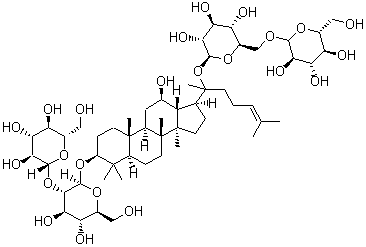Ginsenosides 8%-80%
| Post Date: | Dec 01,2021 |
| Expiry Date: | Dec 01,2022 |
| Detailed Description: |
Cas No. :41753-43-9 Quantity: 2Metric Tons Specs:Ginsenosides 8%-80% Payment Method: L/C,T/T,Western Union,Escrow Botanical Name: Panax ginseng C. A. Mey Product Specification: Ginsenosides 8%-80% Active Ingredient: Ginsenosides Appearane: Fine powder Color: Light yellow to yellow brown Part of the plant used: root/leaf Extract method: Grain alcohol Test method: UV/HPLC CAS No.: 41753-43-9 Molecular weight:1109.29 Molecular structure:C54H92O23 Solubility: Soluble in ethanol Safety evaluation: innocuous What is it? Ginseng is a plant characterized by a fleshy root and a single stalk with green oval-shaped leaves. It is a perennial plant that can live more than a century. Ginseng extract is typically derived from the root of this plant. As an herbal supplement, the extract has long been prized for its reputation of having anti-inflammatory, anti-cancer, and antioxidant properties. It is also used in the homeopathic treatment of conditions, including depression, stress, low libido, and attention deficit hyperactivity disorder (ADHD). Studies have shown that ginseng extract can improve balance, help prevent diabetes, cure anemia, and strengthen the gastrointestinal system. Research in Asia has also shown thatginseng extract can benefit people who have coughs, asthma, and tuberculosis. Both the physical and mental effects of stress have been improved with the use of ginseng. It was even found to decrease the effects of alcohol intake and subsequent hangovers. Ginseng extract is a common ingredient in energy drinks, ginseng tea, and diet aids. Otherginseng products include chewing gum, candy, deodorant, and hair gel. Products that contain Siberian ginseng, also called eleuthero, may be misleading as this particular herb is technically not ginseng. Although the benefits of Siberian ginseng extract are similar to that of ginseng, the plant has a woody root that is unlike the fleshy root of a true ginseng species. Uses: In terms of modern scientific research, ginseng is known to be an adaptogen. Adaptogens are substances that assist the body to restore itself to health and work without side effects even if the recommended dose is widely exceeded. Ginseng due to its adaptogens effects is widely used to lower cholesterol, increase energy and endurance, reduce fatique and effects of stress and prevent infections. Ginseng is one of the most effective anti-aging supplements. It can alleviate some major effects of aging, such as degeneration of the blood system, and increase mental and physical capacity. Other important benefits of ginseng is its support in cancer treatment and its effects on sports performance. Function: To reinforce the vital energy, to remedy collapse and restore the normal pulse, to benefit the spleen and lung, to promote the production of body fluid and to calm the nerves. Treatment claims for Asian ginseng are numerous and include the use of the herb to support overall health and boost the immune system. Traditional and modern uses of ginseng include: |
| CAS Registry Number: |
41753-43-9 |
| Synonyms: | ;Sanchinoside E1;Arasaponin E1;GRb 1;Gynosaponin C;Gypenoside III;NSC 310103;Panax saponin E;Pseudoginsenoside D;2-O-beta-Glucopyranosyl-(3beta,12beta)-20-((6-O-beta-D-glucopyranosyl-beta-D-glucopyranosyl)oxy)-12-hydroxydammar-24-en-3-yl-beta-D-glucopyranoside;beta-D-Glucopyranoside, (3-beta,12-beta)-20-((6-O-beta-D-glucopyranosyl-beta-D-glucopyranosyl)oxy)-12-hydroxydammar-24-en-3-yl 2-O-beta-D-glucopyranosyl-;20-[(6-O-hexopyranosylhexopyranosyl)oxy]-12-hydroxydammar-24-en-3-yl 2-O-hexopyranosylhexopyranoside;(2S,3R,4S,5S,6R)-2-[1-[(3S,5R,8R,9R,10R,12R,13R,14R,17S)-3-[(2R,3R,4S,5S,6R)-4,5-dihydroxy-6-(hydroxymethyl)-3-[(3R,4S,5S,6R)-3,4,5-trihydroxy-6-(hydroxymethyl)tetrahydropyran-2-yl]oxy-tetrahydropyran-2-yl]oxy-12-hydroxy-4,4,8,10,14-pentamethyl-2,3,5,6,7,9,11,12,13,15,16,17-dodecahydro-1H-cyclopenta[a]phenanthren-17-yl]-1,5-dimethyl-hex-4-enoxy]-6-[[(3R,4S,5S,6R)-3,4,5-trihydroxy-6-(hydroxymethyl)tetrahydropyran-2-yl]oxymethyl]tetrahydropyran-3,4,5-triol; |
| Molecular Formula: | C54H92O23 |
| Molecular Weight: | 1109.2945 |
| Molecular Structure: | 
|
| Hazard Symbols: | |
| Risk Codes: | R20/21/22:; |
| Safety Description: | S26:; S36:; |


